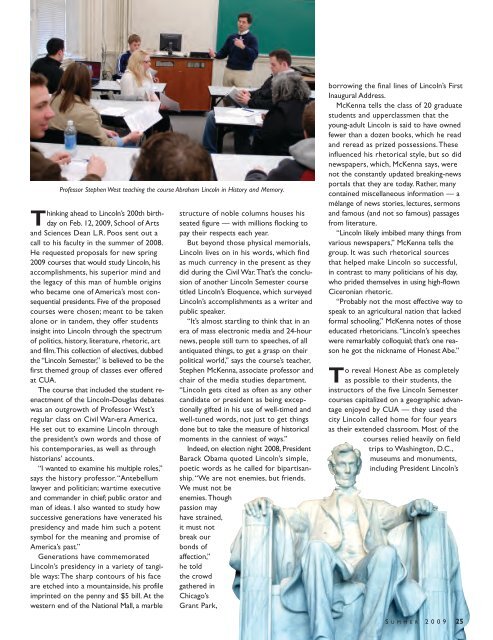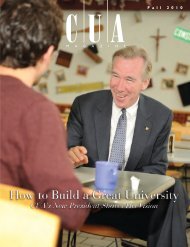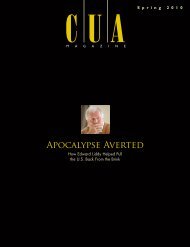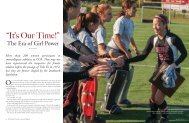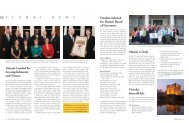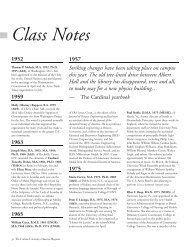Phenoms Under 40 - CUA Magazine - The Catholic University of ...
Phenoms Under 40 - CUA Magazine - The Catholic University of ...
Phenoms Under 40 - CUA Magazine - The Catholic University of ...
You also want an ePaper? Increase the reach of your titles
YUMPU automatically turns print PDFs into web optimized ePapers that Google loves.
Pr<strong>of</strong>essor Stephen West teaching the course Abraham Lincoln in History and Memory.Thinking ahead to Lincoln’s 200th birthdayon Feb. 12, 2009, School <strong>of</strong> Artsand Sciences Dean L.R. Poos sent out acall to his faculty in the summer <strong>of</strong> 2008.He requested proposals for new spring2009 courses that would study Lincoln, hisaccomplishments, his superior mind andthe legacy <strong>of</strong> this man <strong>of</strong> humble originswho became one <strong>of</strong> America’s most consequentialpresidents. Five <strong>of</strong> the proposedcourses were chosen; meant to be takenalone or in tandem, they <strong>of</strong>fer studentsinsight into Lincoln through the spectrum<strong>of</strong> politics, history, literature, rhetoric, artand film. This collection <strong>of</strong> electives, dubbedthe “Lincoln Semester,” is believed to be thefirst themed group <strong>of</strong> classes ever <strong>of</strong>feredat <strong>CUA</strong>.<strong>The</strong> course that included the student reenactment<strong>of</strong> the Lincoln-Douglas debateswas an outgrowth <strong>of</strong> Pr<strong>of</strong>essor West’sregular class on Civil War-era America.He set out to examine Lincoln throughthe president’s own words and those <strong>of</strong>his contemporaries, as well as throughhistorians’ accounts.“I wanted to examine his multiple roles,”says the history pr<strong>of</strong>essor. “Antebellumlawyer and politician; wartime executiveand commander in chief; public orator andman <strong>of</strong> ideas. I also wanted to study howsuccessive generations have venerated hispresidency and made him such a potentsymbol for the meaning and promise <strong>of</strong>America’s past.”Generations have commemoratedLincoln’s presidency in a variety <strong>of</strong> tangibleways: <strong>The</strong> sharp contours <strong>of</strong> his faceare etched into a mountainside, his pr<strong>of</strong>ileimprinted on the penny and $5 bill. At thewestern end <strong>of</strong> the National Mall, a marblestructure <strong>of</strong> noble columns houses hisseated figure — with millions flocking topay their respects each year.But beyond those physical memorials,Lincoln lives on in his words, which findas much currency in the present as theydid during the Civil War. That’s the conclusion<strong>of</strong> another Lincoln Semester coursetitled Lincoln’s Eloquence, which surveyedLincoln’s accomplishments as a writer andpublic speaker.“It’s almost startling to think that in anera <strong>of</strong> mass electronic media and 24-hournews, people still turn to speeches, <strong>of</strong> allantiquated things, to get a grasp on theirpolitical world,” says the course’s teacher,Stephen McKenna, associate pr<strong>of</strong>essor andchair <strong>of</strong> the media studies department.“Lincoln gets cited as <strong>of</strong>ten as any othercandidate or president as being exceptionallygifted in his use <strong>of</strong> well-timed andwell-tuned words, not just to get thingsdone but to take the measure <strong>of</strong> historicalmoments in the canniest <strong>of</strong> ways.”Indeed, on election night 2008, PresidentBarack Obama quoted Lincoln’s simple,poetic words as he called for bipartisanship.“We are not enemies, but friends.We must not beenemies. Thoughpassion mayhave strained,it must notbreak ourbonds <strong>of</strong>affection,”he toldthe crowdgathered inChicago’sGrant Park,borrowing the final lines <strong>of</strong> Lincoln’s FirstInaugural Address.McKenna tells the class <strong>of</strong> 20 graduatestudents and upperclassmen that theyoung-adult Lincoln is said to have ownedfewer than a dozen books, which he readand reread as prized possessions. <strong>The</strong>seinfluenced his rhetorical style, but so didnewspapers, which, McKenna says, werenot the constantly updated breaking-newsportals that they are today. Rather, manycontained miscellaneous information — amélange <strong>of</strong> news stories, lectures, sermonsand famous (and not so famous) passagesfrom literature.“Lincoln likely imbibed many things fromvarious newspapers,” McKenna tells thegroup. It was such rhetorical sourcesthat helped make Lincoln so successful,in contrast to many politicians <strong>of</strong> his day,who prided themselves in using high-flownCiceronian rhetoric.“Probably not the most effective way tospeak to an agricultural nation that lackedformal schooling,” McKenna notes <strong>of</strong> thoseeducated rhetoricians. “Lincoln’s speecheswere remarkably colloquial; that’s one reasonhe got the nickname <strong>of</strong> Honest Abe.”To reveal Honest Abe as completelyas possible to their students, theinstructors <strong>of</strong> the five Lincoln Semestercourses capitalized on a geographic advantageenjoyed by <strong>CUA</strong> — they used thecity Lincoln called home for four yearsas their extended classroom. Most <strong>of</strong> thecourses relied heavily on fieldtrips to Washington, D.C.,museums and monuments,including President Lincoln’sS U M M E R 2 0 0 9 25


